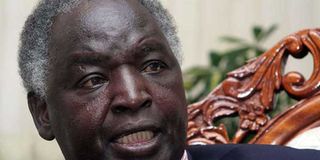Church’s fight for institutions has been decades-long journey

President Kenyatta’s maternal uncle George Muhoho. Either by coincidence or otherwise, few had privileged access to study and document Vatican’s official policies and objectives for investment in education in Kenya like Dr Muhoho. PHOTO | FILE | NATION MEDIA GROUP
What you need to know:
- With the presidential decree last week, it seems, the church lost a battle in the 1960s, and is winning the war in 2018.
- To others, a Catholic President has overturned what his Protestant father Jomo Kenyatta did half a century ago.
Controversial former US envoy to Kenya Smith Hempstone wrote in his memoirs, The Rogue Ambassador, that unlike governments that think and plan in the short term, the Catholic Church viewed things in centennial cycles.
It is a lens with which some may view President Uhuru Kenyatta’s recent directive that the Education ministry relinquish management functions churches lost to the State through the Teachers Service Commission (TSC) in the late 1960s.
It is not yet clear if the order was in response to a request from religious institutions, but the hand of the Catholic church is writ large.
DIRECTIVE
The President issued his directive during the funeral service of Archbishop John Njenga, a consolation for the Catholic lobbyists who for decades waged a transgenerational war for recovery of assets the church felt were “nationalised” to the detriment of its original mission in Kenya. Archbishop Njenga played a central role in negotiating with the government on schools management before the Education Act was passed in 1968.
The position of the church has never been ambiguous since the government seized control of education management and set up TSC as the sole authority for teacher recruitment, deployment, discipline and transfer among other functions.
To the Catholic Church, education institutions are critical and key sites of the evangelisation infrastructure, not separate from it.
GEORGE MUHOHO
Either by coincidence or otherwise, few had privileged access to study and document Vatican’s official policies and objectives for investment in education in Kenya like President Kenyatta’s maternal uncle George Muhoho has.
In a rare revelation of the Vatican’s official thinking in investing heavily in education in Kenya and Africa since the scramble for the continent, Dr Muhoho wrote in 1970 that Rome’s policy to have influence in future Kenya was crafted way back in 1924.
Scrambling for the souls of the “natives” between the Protestant missionaries who enjoyed an affinity with the British colonial authorities, Vatican agents authored a circular in 1924 which Dr Muhoho quoted in part as the Catholic Church’s “reading of the signs of the times”.
DOCTORAL THESIS
In his doctoral thesis submitted to Urbana University, he noted the circular defined Rome’s policy to counter what it viewed as Protestants’ efforts to hog all the locals for themselves:
“The Protestant Missionary Societies are alive to the fact that he who holds the school holds the future...This shows the necessity for us to make up for the lost time if we are to have any influence with the leaders of this colony, and any hold on the country itself,” said the circular.
The author of the circular to directors of Catholic Church education departments is identified as a Fr MacNamara, secretary for education under the Vicariate of Zanzibar, then overseeing Catholic evangelical efforts in East Africa.
He concluded by stating that Kenyans did not share the Christian thought, which made it difficult to evangelise them, hence the need for schools and education as tools and platforms for infusion of the Christian thought.
Dr Muhoho is both a trained Catholic priest and former Vatican ambassador to Brussels, before he opted out of priesthood.
His doctoral thesis is titled The Church’s Role in Development of the Education Policy in the Pluralistic Society in Kenya.
COLONIAL POLICY
The colonial government ran a policy of separate education curriculum and schools and teachers pay structures for Europeans, Asians and Africans.
The demand for education outstripped what an extractive imperial enterprise was willing to provide.
Missionaries stepped into the gap to advance their diverse interests through education. Access of missionary schools was hampered by demands for conversion as allegiance was a key admission consideration.
This obtained until the Kanu manifesto arrived with a national unity policy, implemented through recommendations of the Ominde Commission (1964), and enacted in the Education Bill of 1967.
Among others the commission recommended: “To avoid partiality towards members of any racial, religious or social group, it recommended management to be taken away from sectarian oriented voluntary agencies and given to neutral local authorities, local communities for primary school and boards of governors for secondary schools,” Dr Muhoho wrote.
Protestant missionaries obliged and handed over management of their schools to the ministry to implement the new policy without much fuss.
The Catholic Church had reservations and put up a spirited fight, but lost the battle, grudgingly caving in to demands.
Among gripes include the “sponsorship” role was a bad compromise of the original objectives for setting up schools, and never really settled for a secular state via TSC’s overriding mandate to recruit, deploy and transfer teachers, edging the church out.
With the presidential decree last week, it seems, the church lost a battle in the 1960s, and is winning the war in 2018.
To others, a Catholic President has overturned what his Protestant father Jomo Kenyatta did half a century ago.




